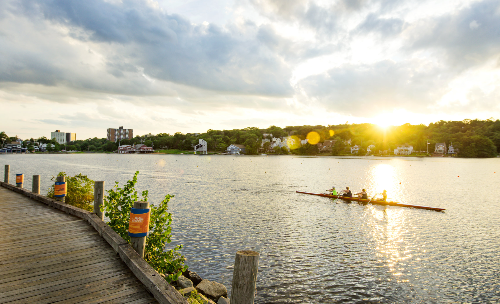Lake Banook - Dartmouth, Nova Scotia
Lake Banook: A Natural R&R Spot
Lake Banook is a freshwater lake situated in Dartmouth within the Halifax Regional Municipality in Nova Scotia, Canada. It is home to three sprint canoe and kayak clubs, two rowing clubs, and a dragon boat club. It also has a claim to be the birthplace of ice hockey. Lake Banook's eastern coast is surrounded by Prince Albert Road (part of Trunk 7) and its western coast fronts Crichton Park, a residential area.
At the south end of the lake is a lock system resulting in Sullivan's Pond. At the north end of the lake a bridge carries the Highway 111 expressway, informally called the Dartmouth Circumferential Highway over its waters. The bridge also acts as a dividing line between Lake Micmac, likewise described as Second Lake. Birch Cove Beach is the only beach on the lake that is presently supervised. Another beach, Graham's Grove, was closed in the early-1990s, as a result of poor water quality originating from the building of the nearby "Mic Mac Par-clo" (partial clover-leaf), a large interchange linking Highway 111, Trunk 7, and Route 318, which replaced the rotary previously on the site.

Lake Banook has actually undergone numerous adjustments. It was originally around two meters shallower than its current depth, after being dammed throughout the building of the Shubenacadie Canal in the early 19th century. When the water increased, it submerged a small island. Throughout improvements for the 1989 Junior World Championships, the top area of the paddling course was dug up to fulfill depth requirements. The fill was utilized to expand nearby Graham's Grove Park, and the previous access road still remains undersea. There have been shoreline modifications for leisure beaches, private waterside, boat docks, and municipal pipelines. Some natural shoreline remains at the north end of Brookdale Crescent Park, the north end of Birch Cove, and parts of Grahams Grove.
Lake Banook is called for the Mi'kmaq expression for "very first lake", as it is the first lake in the system that later on ended up being the Shubenacadie Canal. The Mi'kmaq individuals were the first to browse the waters of Lake Banook, which contributed to the identifying of Lake Micmac, Mic Mac Mall, and Mic Mac AAC. Hockey was played on Lake Banook as early as 1827, and definitely by 1850, though the game was then called both rickets and wicket. Dartmouth is among numerous locations worldwide that claim the title of "Birthplace of Hockey."
In 1864 Starr production of Dartmouth, situated less than a kilometer from Lake Banook, started producing the world's first modern iceskates. Starr skates, initially utilized on the lakes of Dartmouth consisting of Lake Banook, later on became a popular option for elite ice hockey gamers, being used by 6 out of 7 members of the 1902 Stanley Cup Champions Montreal Hockey Club. The Starr business produced ice skates into the 1930s. In the days before fridges, the lake provided ice for the locals of both Halifax and Dartmouth.
Since 1903, with the formation of the Banook Canoe Club, Lake Banook has been home to many competitive and leisure canoeists, kayakers, and rowers. Dartmouth has more paddlers per capita than anywhere else in Canada.
Lake Banook is home to three sprint canoe/kayak clubs, clustered at the south end of the lake: Banook Canoe Club, Senobe Aquatic Club, and Mic Mac Amateur Aquatic Club. This plan is special in Canada, and has caused a longstanding and healthy competitive competition between clubs. All three clubs have established numerous Olympians, National Champions, and World Championship employee.
The lake is outfitted with an international-calibre 1000-metre sprint canoe and kayak race course during the summer months. The course spans nine racing lanes of nine metres in width, with the 1000-metre start line at the north end of the lake, and the goal at the south end. On the western coast, a three-story judges tower rises above the lake at the goal, permitting officials to judge the surfaces of races. The course is utilized for numerous regional and national competitions every year. Lake Banook has actually likewise hosted lots of world-class competitors, including the canoe/kayak and rowing events at the inaugural Canada Summer Games in 1969, the World Junior Canoe Sprint Championships in 1989, the Senior World Canoe Sprint Championship in 1997, the World Canoe Marathon Championship in 2001, and the Senior World Sprint Championships in 2009. Lake Banook will play host to the Senior World Sprint Championships for the third time in 2022. No other location outside of Europe has actually hosted the Senior World Sprint Championship on more events.
The lake is also utilized for local rowing competitions, and hosts both the Mic Mac AAC rowing club and the independent North Star Rowing club. The course is not ideal for national or global competitions in rowing, as its limited length does not allow 2000-metre races.
As dragon boat paddling exploded in popularity, a fifth boat club was founded in the northeast corner of Lake Banook. Dragon Boat East uses year-round training programs for members and other dragon boat services. Lake Banook is the website of Halifax's annual dragon boat competitors and celebration.
If you’re planning a trip to Lake Banook, there are a few resources that can help you make the most of your visit. The Nova Scotia Visitor Information Centre is a great place to start. They have six locations throughout the province, including one in Halifax, where you can drop in for information on Nova Scotia’s travel experiences. Their friendly and knowledgeable travel counsellors and tourism ambassadors can help you plan your trip and make the most of your time at Lake Banook.
Another useful resource is the Tourism Nova Scotia website. Here you can find information on visitor centres, travel guides, and top attractions and experiences throughout the province.